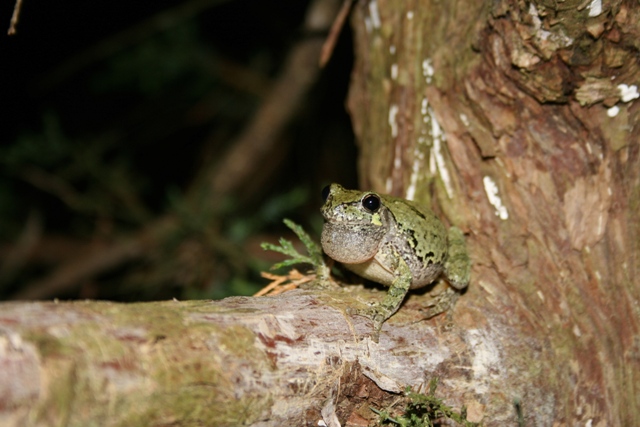Feb 4 2016
The year 2015 has been labeled as the hottest year on record, based on reports from NASA and the National Oceanic and Atmospheric Administration (NOAA). A researcher from the University of Missouri claims that the rising temperatures and climate unpredictability could impact the sounds produced by gray treefrogs.
 Gray Treefrog, Hyla versicolor, Credit: Brice Grunert
Gray Treefrog, Hyla versicolor, Credit: Brice Grunert
A research group discovered that a female’s interpretation of male mating calls may not be affected by the changes in climate. But it is important to know how breeding habits are affected so that the data can help to predict the condition of ecosystems. The findings will aid better management practices of ecosystems by the government.
Gray treefrogs are found commonly in North America, especially across the eastern two-thirds of the U.S, including Missouri. They can be recognized by their sticky toe pads, which enable them to cling to windows, and also by the male mating calls, or trills, which differentiates them on warm, summer evenings.
In a way, the decline of the polar bear has become the face of climate change; yet, gray tree frogs located in our own backyards might give us better clues about changes in the environment. Our team wanted to take a look at how rising temperatures might affect how female gray tree frogs interpret the signals given off by males and whether or not that might interrupt their breeding habits.
Sarah C. Humfeld, Postdoctoral Fellow of Biological Sciences, MU College of Arts and Science
In mating season, the male treefrogs generate calls to attract female mates. The females then interpret the trilled call based on their different characteristics, to help them spot a superior male of the correct species.
It is a known fact that the pitch and rate of trilling are likely to depend on temperatures, frequently linked to the falling or rising temperatures experienced by the cold-blooded frogs.
We already know that there’s an optimal range for male mating calls. When temperatures rise, the pitch and trill rate of the calls can increase. What we didn’t know, was whether or not females’ interpretation of those calls were dependent on temperature as well. We were interested in studying whether or not the responses of the female’s auditory system shifted in tandem with the male’s calls at different temperatures.
Sarah C. Humfeld, Postdoctoral Fellow of Biological Sciences, MU College of Arts and Science
The researchers collected a few female treefrogs from the field and examined them in the lab. The lab temperature was slightly elevated to simulate a warmer climate. Then the researchers played various types of computer-synthesized mating sounds to study how the females responded.
We found that temperature didn’t have a great effect on females and their interpretation of the mating call; however, these are still important findings. Amphibians are the veritable ‘canary in the coal’ mine, an indicator species that can send signals to scientists who study the effects of rising global temperatures. Knowing more about how their mating habits are affected by climate change can help us study the ways rising temperatures are affecting biodiversity. Findings from our study help add to the knowledge base needed to study thermal tolerance levels for various species and the steps conservation managers can take to maintain various ecological systems.
Sarah C. Humfeld, Postdoctoral Fellow of Biological Sciences, MU College of Arts and Science
The research paper titled “Effects of Temperature on Spectral Preferences of Female Gray Treefrogs (Hyla versicolor)” was published in the Herptological Conservation and Biology journal.